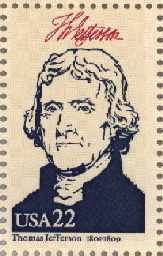
To Lafayette Monticello, May 4, 1817Although, dear Sir, much retired from the world, and meddling little in its concerns, yet I think it almost a religious duty to salute at times my old friends, were it only to say and to know that "all's well." Our hobby has been politics; but all here is so quiet, and with you so desperate, that little matter is furnished us for active attention. With you too, it has long been forbidden ground, and therefore imprudent for a foreign friend to tread, in writing to you. But although our speculations might be intrusive, our prayers cannot but be acceptable, and mine are sincerely offered for the well-being of France. What government she can bear, depends not on the state of science, however exalted, in a select band of enlightened men, but on the condition of the general mind. That, I am sure, is advanced and will advance; and the last change of government was fortunate, inasmuch as the new will be less obstructive to the effects of that advancement. For I consider your foreign military oppressions as an ephemeral obstacle only. Here all is quiet. The British war has left us in debt; but that is a cheap price for the good it has done us. The establishment of the necessary manufactures among ourselves, the proof that our government is solid, can stand the shock of war, and is superior even to civil schism, are precious facts for us; and of these the strongest proofs were furnished, when, with four eastern States tied to us, as dead to living bodies, all doubt was removed as to the achievements of the war, had it continued. But its best effect has been the complete suppression of party. The federalists who were truly American, and their great mass was so, have separated from their brethren who were mere Anglomen, and are received with cordiality into the republican ranks. Even Connecticut, as a State, and the last one expected to yield its steady habits (which were essentially bigoted in politics as well as religion), has chosen a republican governor, and republican legislature. Massachusetts indeed still lags; because most deeply involved in the parricide crimes and treasons of the war. But her gangrene is contracting, the sound flesh advancing on it, and all there will be well. I mentioned Connecticut as the most hopeless of our States. Little Delaware had escaped my attention. That is essentially a Quaker State, the fragment of a religious sect which, there, in the other States, in England, are a homogeneous mass, acting with one mind, and that directed by the mother society in England. Dispersed, as the Jews, they still form, as those do, one nation, foreign to the land they live in. They are Protestant Jesuits, implicitly devoted to the will of their superior, and forgetting all duties to their country in the execution of the policy of their order. When war is proposed with England, they have religious scruples; but when with France, these are laid by, and they become clamorous for it. They are, however, silent, passive, and give no other trouble than of whipping them along. Nor is the election of Monroe an inefficient circumstance in our felicities. Four and twenty years, which he will accomplish, of administration in republican forms and principles, will so consecrate them in the eyes of the people as to secure them against the danger of change. The evanition of party dissensions has harmonized intercourse, and sweetened society beyond imagination. The war then has done us all this good, and the further one of assuring the world, that although attached to peace from a sense of its blessings, we will meet war when it is made necessary. I wish I could give better hopes of our southern brethren. The achievement of their independence of Spain is no longer a question. But it is a very serious one, what will then become of them? Ignorance and bigotry, like other insanities, are incapable of self-government. They will fall under military despotism, and become the murderous tools of the ambition of their respective Bonapartes; and whether this will be for their greater happiness, the rule of one only has taught you to judge. No one, I hope, can doubt my wish to see them and all mankind exercising self-government, and capable of exercising it. But the question is not what we wish, but what is practicable? As their sincere friend and brother then, I do believe the best thing for them, would be for themselves to come to an accord with Spain, under the guarantee of France, Russia, Holland, and the United States, allowing to Spain a nominal supremacy, with authority only to keep the peace among them, leaving them otherwise all the powers of self-government, until their experience in them, their emancipation from their priests, and advancement in information, shall prepare them for complete independence. I exclude England from this confederacy, because her selfish principles render her incapable of honorable patronage or disinterested co-operation; unless, indeed, what seems now probable, a revolution should restore to her an honest government, one which will permit the world to live in peace. Portugal, grasping at an extension of her dominion in the south, has lost her great northern province of Pernambuco, and I shall not wonder if Brazil should revolt in mass, and send their royal family back to Portugal. Brazil is more populous, more wealthy, more energetic, and as wise as Portugal. I have been insensibly led, my dear friend, while writing to you, to indulge in that line of sentiment in which we have been always associated, forgetting that these are matters not belonging to my time. Not so with you, who have still many years to be a spectator of these events. That these
years may indeed be many and happy, is the sincere prayer of your
affectionate friend. |
